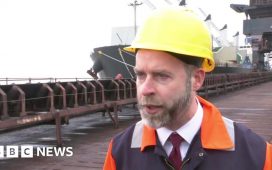A Virgin Atlantic flight will set off on Tuesday from London Heathrow for New York, a Boeing 787 shorn of paying passengers but with a payload of scientists, aviation leaders, politicians and media, and powered largely by used-cooking oil – or as it is now better known, sustainable aviation fuel (SAF).
The UK government and aviation industry hope the transatlantic journey, funded with £1m of taxpayer’s money, will demonstrate that greener flying is possible and its 2050 “jet zero” aspirations are more than hot air.
However, is the trip – as claims the transport secretary, Mark Harper, who himself is preparing to strap – a historic moment paving the way to change the future of flight? Or as others argue, a one-off stunt that the airline industry will struggle to emulate – and worse, one that convinces the public they can fly without environmental damage?
Undoubtedly, the test flight demonstrates that the dial has turned on what is technically possible: the creation and use of a full tank of alternative fuel, synthesised from captured carbon and recycled oil. According to the producers, the carbon footprint of the flight is about 70% below that of conventional jet fuel, in a “lifecycle” analysis.

The aviation industry now believes SAFs are the single biggest tool for bringing net carbon emissions down to zero – in its roadmap to 2050 that still allows for substantial growth in flying.
That alarms environmental campaigners, who are sceptical about the merits of the fuels and have expressed disquiet over the language used by the government about the flight.
Announcing £53m this month to fund nine UK projects to create SAF in different ways, from burning waste to converting CO2 and green hydrogen, the Department for Transport declared it a “milestone marker” ahead of the 100% SAF flight “making guilt-free flying a reality”.
Even more hyperbolic – and plain wrong – according to Cait Hewitt, policy director at the Aviation Environment Federation (AEF), was the assertion that passengers were now a “step closer to flying without CO2 emissions”.
Not even the airline would dream of that: a Virgin Atlantic spokesperson confirmed that the CO2 emissions out of the back of the plane on Tuesday will be identical, although it claims the “net” emissions – calculated by the carbon saved in recycling oil – to be 70% less.
Hewitt said the federation “had already started to feel increasingly uneasy about the claims being made for SAF, even while the official modelling gave it a much more modest role and leading scientists were expressing deep scepticism.”

There remains a huge supply issue, she said, and proposed waste-based fuels cannot be scaled up sustainably: “The hype risks the challenge of decarbonising aviation being hushed up.”
Even the very term SAF, covering an array of very different alternative production processes, is problematic; as the AEF puts it: “The sustainability of alternative fuels needs to be assessed, not assumed.”
The consensus of campaigners is that only e-kerosene – created with green hydrogen, capturing carbon dioxide from the air, with a direct and definite rather than hypothetical reduction in CO2 – looks a truly sustainable future fuel.
However, despite the growth in wind and solar power and the technological advances, aviation would need to lay claim to enormous amounts of renewable energy to create such fuel. At that point, said Matt Finch, UK policy manager of Transport & Environment, a clean transport campaign group: “The question isn’t can we make it but should we – what is the best use of renewable electricity?”
after newsletter promotion
The aviation industry argues it is a unique case – while cars, homes and power stations can decarbonise, the options for long-haul commercial planes, at least for the foreseeable next few decades, are either jet fuel or stay on the ground.
The complaints that Harper is now hearing forcefully from airlines are not SAF scepticism but SAF hunger – and calls for the UK to scale up production ever faster to meet demand, as well as subsidise and mandate the use of the greener fuels.
While the transport secretary last week told an airline conference that there would be five SAF production plants under way by 2025 “to build Britain’s SAF base”, industry leaders said action was slow. Sean Doyle, chief executive of British Airways, whose planned waste-to-fuel plant has been under discussion for a decade, said: “We’re struggling to really just get the ball rolling and getting plants built. Maybe we need to look at what other jurisdictions and governments are doing, who are getting ahead of us in that regard.”
Oriel Petry, head of public affairs of Airbus UK, said there was “frustration” at the pace of change, adding: “The kind of ambition to have five sites in the UK producing SAF by 2025 looks quite challenging – maybe we don’t have the foundations to make that work.”

Neither will this parliament now introduce a promised “revenue certainty mechanism”, designed to encourage investment in and production of SAFs, which are now several times more expensive than normal jet fuel. Heathrow airport also weighed in last week to urge legislation before it was “too late for the UK to benefit from jobs, growth and energy security this would bring”.
Not all in aviation agree: Tim Clark, president of Emirates, has been a significant dissenter, questioning whether there would ever be sufficient feedstocks such as waste cooking oil to convert into SAF. Beyond that, he argues, investing in alternative “drop-in fuels” – ie those that can power existing jet engines – risks losing focus from creating a new generation of more efficient planes, or possible future technologies.
Meanwhile, as Virgin’s blend of recycled European cooking oil and US corn waste burns up in the skies, the conceptual questions raised by SAFs linger like contrails. Clean energy expert Michael Liebrich questions the energy lost in conversion, saying it would almost certainly be more efficient to keep on using kerosene and capturing other CO2 than creating SAFs: “It would be lower cost and there would be less CO2 overall. If you don’t care about eventually burning it from the back of the aeroplane, I don’t see that it is functionally different.”










